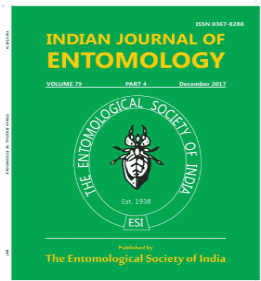Field Evaluation of Biopesticides against Rice Insect Pests under Organic Farming
DOI:
https://doi.org/10.55446/IJE.2021.348Keywords:
Field evaluation, rice, Scirpophaga sp., Cnaphalocrocis medinalis, Ecotin, Achook, basmati, non-basmati, stem borers, deadhearts, damaged leaves, rice yield, organic farmingAbstract
Neem based commercial formulations Ecotin (azadirachtin 5%; 50,000 ppm) @ 150,175 and 200 ml ha-1, and standard checks- Achook (azadirachtin 0.15%; 1500 ppm) @ 2500 ml ha-1 were applied at pest appearance for evaluating them for the management of rice stem borers Scirpophaga spp. and leaf folder Cnaphalocrocis medinalis (Guenee) on basmati and non-basmati rice under organic cultivation conditions. In basmati, the reduction of deadhearts due to stem borers was observed to be maximum with Ecotin @ 200 ml ha-1 as 55.79 and 56.84% at 5 and 10 DAS, respectively; while white ears were at 55.99% in 2019; and reduction of deadhearts was 50.45 and 45.75% at 5 and 10 DAS, respectively, while white ears reduced up to 50.71% in 2020. Similarly, reduction of damaged leaves due to leaf folder was 55.80 and 59.62% at 5 and 10 DAS, respectively; and in 2020, it was 50.45 and 45.75% at 5 and 10 DAS, respectively. Ecotin 5% @ 200 ml ha-1 gave maximum crop yield (31.29 q ha-1). In non-basmati rice too the reduction of deadhearts was maximum with Ecotin @ 200 ml ha-1, while white ears reduced by 50.47% in 2019, with similar trend in 2020; also results were of similar trend with leaf folder. The occurrence of spiders revealed a non-significant difference among the treatments. The biopesticides caused no residual or phytotoxic effects and were safe to the environment and predatory fauna.
Downloads
Metrics
Downloads
Published
How to Cite
Issue
Section
References
Anonymous 2021. Package of practices for crops of Punjab. Kharif 2020. Punjab Agricultural University, Ludhiana, Punjab, India 38 (1): 1-23.
Bora D K, Bhuyan U, Katti G, Pasalu I C. 2004. Quantification of insect pest and natural enemy incidence vis a vis yield. Uttar Pradesh Journal of Zoology 24: 187-190.
Dhaliwal G S, Gill R S, Dilawari V K, Dhawan A K.1998. Management of insect-pest complex of cabbage with neem based insecticides. Ecological Agriculture and Sustainable Development 2: 306-314.
Ho D T, Kibuka J K. 1983. Neem (Azadirachta indica) products or control of rice borers. International Rice Research News Letters 8 (5): 15-16.
Kaul B K, Sharma P K. 1999. Efficacy of neem based insecticides against the major insect pests. Journal of Entomological Research 23 (4): 377-379.
Longkumer I, Yimjenjang K, Singh I, Singh A. 2017. Efficacy of eco-friendly insecticides against rice leaf folder under kharif rice-crop-ecosystem of Manipur valley. International Journal of Pure and Applied Biosciences 5 (5): 1574-1577.
Mohapatra L N, Nayak S K. 2015. Evaluation of IPM module against insect pest complex of rice. Indian Journal of Entomology 77: 35-38.
Murugabharathi J, Balasubramanian G. 1999. Relative efficacy of botanicals against rice stems borer and leaf folders and their safety to natural enemies. Neem News Letter 16: 25.
Nanda U K, Parija B, Nanda B, Dash D D, Pradhan N C. 1996. Bio-efficacy of neem derivatives against the paddy insect pest complex. Abstracts. World neem conference. 24-28 February, 1996. Bangalore, India. p. 14.
Nigam V D, Sharma S C, Ali S. 2010. Comparative bioefficacy of some insecticides against rice leaf-folder, Cnaphalocrocis medinalis (Guenee). Indian Journal of Entomology 72: 293-296.
Ponnusamy K. 2003. Farmers’ participatory assessment of neem based insecticide in controlling the ear head bug (Leptocorisa acuta) in rice. Madras Agricultural Journal 90 (7-9): 564-566.
Saikial P, Parameswaran S. 2003. Evaluation of EC formulations of plant derivatives against rice leaf folder, Cnaphalocrocis medinalis (Guenee). Annals of Plant Protection Science 11: 204-206.
Sharma S and Aggarwal N. 2014. Comparing efficacy of biopesticides for the management of insect pests in aromatic rice under organic farming system. Journal of Biological Control 28 (2): 87-92.
Sogawa K, Liu G J, Shen J H. 2003. A review on the hyper-susceptibility of Chinese hybrid rice to insect pests. Chinese Journal of Rice Science 17: 23-30.
















